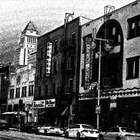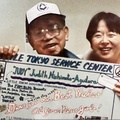Read Chapter One >>
It turns out that the dead body discovered near the parking lot of Japanese Village Plaza in Los Angeles was not my fourteen-year-old daughter’s. It was of a much older Asian woman in her seventies. Name not released. At least that’s what it says in The Rafu Shimpo, the local newspaper that usually would be my last source of information, other than the obituaries. That was until I temporarily moved my business and home here to J-town, Little Tokyo—emphasis on temporary.
The Rafu Shimpo is actually hand delivered to some businesses here on First Street while most subscribers get it via U.S. postal service or the Internet. Since my landlord’s son, Cameron Soto, has a snack shop right below my P.I. office, I just walk down to get the latest.
“Ran into Officer Brenner outside Starbuck’s but he didn’t give me any details,” Cameron says. I was with Brenner yesterday when he received the alert on his radio about the dead body. I was in the middle of confessing to a crime that I didn’t commit but suspected my daughter Maddy had committed. It’s here in the Rafu as well, below the fold: “Another Little Tokyo Landmark Vandalized with Graffiti.”
This time the target was the Friendship Knot, a giant white fiberglass knot on display on Second Street in front of the outdoor mall, Weller Court. The distinctive tag in all these criminal acts are the letters, “KEV.” Yeah, that’s my nickname, short for Kevin.
I don’t know if it’s how the stars are aligned or whether it’s excitement connected to the Nisei Week Japanese Festival here, but something is definitely off.
“Dad, you have a client.” Maddy enters the snack shop from the back staircase. As usual, she’s dressed in all black, my little goth Hapa daughter. I don’t know if it’s mostly because of hormones, but she’s usually in a bad mood. Her anger has been mostly aimed at me, and understandably so. I’m hoping that this summer together will turn things around for us, but “KEV” spraypainted all over town is not a good sign. (I guess I failed to mention that she’s gotten in trouble for tagging in the past.)
As I turn to leave, Cameron stops me. “Hey, nothing for the newspaper?” He holds out his palm.
I return the newspaper to him. “Charge the next guy, okay?”
When I reach our dusty waiting area, I see a beautiful woman sitting in a metal chair. Maddy, who’s been acting as my receptionist (I know, I’m violating child labor laws), had sense enough to give her a Kirkland bottle of water while she was waiting for me.
The woman’s smooth face and toned legs say thirties, but her neck and hair tell me that she’s in her forties. All my years spent in bars has made me an expert at reading women’s ages. You’d think because I was often either drunk or high or both—that my observational skills were a bit hazy. But when it involved checking out a woman’s anatomy, you can say my senses were always all there.
I guess that I seem a bit tongue-tied, because Maddy, who’s returned to her post behind the receptionist desk, says loudly, “Dad, this is the client.”
“Oh, yeah, of course. Kevin Shirota.” I extend my hand. The woman doesn’t take it. She carefully screws on the top of the water bottle, places the strap of her expensive purse over her shoulder, and rises to her feet.
As she follows me into my small office, I can hear Maddy giggling, “Sike!”
I quickly close the door behind the woman, and situate myself in my fancy ergonomic chair, while offering another plain metal one for her. Where you sit, I’ve learned, is a sign of power. I’m in the expensive, modern seat behind the desk, so I’m the Alpha. But the woman chooses instead to stand.
“So your daughter’s your secretary? She looks like she’s thirteen years old.”
I suppress the urge to correct her that Maddy is fourteen. And a half.
“How can I help you?” I put my hands together on my desk.
The woman says nothing as she takes a quick walk around my office. Most of the furniture was left behind by the previous tenant, who ran an insurance business. It’s mostly thick, heavy, processed wood stuff. Really ugly. The only things that I have on the walls are my P.I. license and a large framed poster of the Pacific Ocean, a reminder of where I plan to be in the future.
She lingers in front of my license. “So you really are a P.I., Mr. Shirota.”
“Call me Kevin. Or Kev.”
“Kev,” she says. “That sounds familiar.”
I frown. What does she mean by that?
“I’d like to hire you, Kev,” she says, with emphasis on the “Kev,” as if she’s telling a joke. “To find out who killed my mother.”
Hearing “kill,” I’m suddenly jolted into the serious nature of her visit. I’ve followed both husbands and wives suspected of having affairs, dug into cases of insurance fraud. I’ve never overseen a murder investigation.
“Is murder too much for you?”
“Nothing is too much for me.” I sound like a pompous ass. “Why don’t you tell me more about it?” I’m expecting her to discuss a cold case that either never went to court or resulted in acquittal.
She stands still, only her mouth moving, and her delicate nostrils flaring a bit as she speaks. “My mother, Satoko Fujii, was killed yesterday in Little Tokyo, and I think that my brother did it.”
© 2014 Naomi Hirahara





